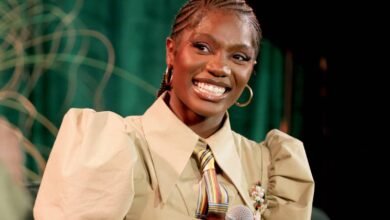Popcaan and Dre Skull on ‘Where We Come From’ 10th Anniversary

2024 saw quick-moving song snippets, boosted by mystery-wrapped algorithms, turn into year-defining singles (but not necessarily lasting stardom). Beating the odds to capture attention looked different in 2014, when Popcaan, one of Jamaica’s top dancehall performers, emerged with Where We Come From, a soulful debut album whose ten-year anniversary was marked by a deluxe edition re-release in November. Where We Come From marked a departure from the club-focused dancehall crossover blueprint established by artists like Sean Paul in the early 2000s—a formula that had lost its sparkle by the 2010s when big box retail sales cratered and the industry scrambled to adapt to a digital marketplace.
Amidst this transition, then-Brooklyn-based DJ and producer Dre Skull started a label, Mixpak, in 2009. His friends in the Jamaican music industry had seen their old distribution channels collapse, “from being able to sell a whole CD, to maybe convincing a fan to buy a single with iTunes, to songs going straight to YouTube,” and called him crazy.
In spite of their caution, over the phone from Los Angeles, Dre Skull remembered feeling “wildly optimistic” when he first traveled to Jamaica to record with dancehall’s reigning boss, Vybz Kartel. Dre Skull and Kartel’s sessions produced Kingston Story, a 2010 album that was celebrated for its conscientiously cheerful temper—and served as a reminder that dancehall was not just an identifiable sound but a scene, held up by intersecting networks of enthusiasts.
That scene included Popcaan, Kartel’s hand-selected protege, who’d contributed a buoyant chorus to Kartel’s single “Clarks” and was later playlisted by New York’s Hot 97 on the strength of a string of solo singles. Dre Skull was impressed by Popcaan’s ‘party songs’ and believed he had the star power to build a career on their foundation. He saw long-term potential in tracks like “Dream” that were as strongly heartfelt as they were powerfully sung.
The two negotiated a singles deal, releasing “Get Gyal Easy” and “The System” via Dre Skull’s Mixpak label in 2012. Along with then-rising Frank Ocean and A$AP Rocky, Popcaan was selected as one of BBC Radio 1Xtra’s “Hottest 20 artists” for the year, before Dre Skull proposed creating what would become Popcaan’s debut album. “I said, by all means, take any other meetings, and there were people considering,” Dre Skull said. “But ultimately, he gave me his trust and put faith in the idea.”
During that period, Popcaan’s mentor Vybz Kartel was imprisoned and charged with murder. “It was a very tough time,” Popcaan told me in November. “It was just me left to make decisions and boss up. I was trying to figure out what direction I was gonna go in my music.”

Courtesy of Mixpak Records
With a team including Jamaican producer Anju Blaxx, Swedish producer Adde Instrumentals, and Mixpak’s Dubbel Dutch, Popcaan set out to make something durable, more concerned with the goal of showcasing his personality than competing in the moment. Pairing beats that stretched from marching (“The System”) to floaty (“Everything Nice”) with Popcaan’s established brand of sweetly emotive ‘singjay’ vocals, the album cohesively focused on messages of advancement and escape, encouraging listeners to channel their own aspirations by singing along. “I just like to go with the flow of life and that’s the way I make music as well. What I’m going through at the time I put it in the music,” said Popcaan, reflecting on the album’s origins and impact. “People liked the songs because of what I was saying and the way I deliver. It’s music that lives in people’s hearts.”
Years before Spotify would launch in Jamaica, the album found an audience on YouTube, where Mixpak shared lyric videos for every song. Popcaan earned fans in artists like Jamie xx, who featured him on a remix of 2015’s “I Know There’s Gonna Be (Good Times),” and Drake, who went on to sample album single “Luh Yuh Bad” for 2016’s “Too Good” with Rihanna. The attention prompted an era of major label momentum for dancehall artists that coincided with increased investment in rap, afrobeats, and Latin music as music’s digital transition continued and streaming revenue began to eclipse download sales industry-wide.
“If you can’t tell how important someone’s music is, how are you going to give them a big record deal, license their music for a movie, or put them on a magazine cover,” Dre Skull said. “Moving to streaming meant there was a paper trail for lots of genres. Now, a Latin artist or an African artist can be a straight-up U.S. pop star; no qualifiers needed of any kind. If you go back to music blogs, that’s the world that we all wanted to see.”
“Listeners are multidimensional,” said Gabsoul, a Brooklyn DJ who remembers Where We Come From as a showcase for all the spaces Popcaan could thrive in and marked his transition into a more “global” sound. “We can be a little gangster, but we can also want to hear a love song. We resonate with Popcaan’s quickness, his free spiritedness. He’s a star, but he can still cook in a bush. He knows how to talk to the gyals, not at us. He can be very positive, but also like: Don’t play with me. I know I’m the shit, and my heart is clean, so I’m gonna do what I need to do in this life.”
The range Popcaan flexed on Where We Come From is now a hallmark of albums from ambitious artists who pursue ubiquity, from Bad Bunny to Burna Boy. “I inspired a lot of artists from every genre across the world,” Popcaan said. “If they was to speak the truth, they’ll tell you: Every music in the world is influenced by Caribbean music.”
If streaming’s rise has driven the global valuation of artists once relegated to regional markets, the algorithmic recommendations that power personalized playlists and drive digital discovery are also more ungovernable than old promotion channels, presenting new challenges for artists looking to replicate success. It’s tough to predict what will connect and harder to sustain an unexpected hit. “There was a lot of pressure to have a follow up and do it the American way — working this market and getting features,” said one label executive whose international artist charted in 2023.
In the decade since Where We Come From’s debut, Popcaan’s signature playfulness has been deployed across the streaming landscape, from electronic experiments with Gorillaz and Rudimental to afrobeats hits from Davido to lover’s anthems with PARTYNEXTDOOR and Jorja Smith. And from a second album with Mixpak in 2018 to this year’s “Lifestyle” with Portmore’s Masicka, he’s continued to offer a distinctly introspective perspective, where poses of braggadocio are rooted in gratitude.
“Crossover is a word people don’t always like to use in the Caribbean,” said Gabsoul. “Because it’s like: What are we crossing over to? And why can’t we just do what we do?
For artists navigating today’s everything-everywhere-all-at-once landscape, Where We Come From‘s intentionally out-of-time, authentically multi-sided approach still offers valuable lessons. “When things change, you just have to stay grounded and believe in what you do,” Popcaan said. “Don’t be afraid to try. You have to believe in it first — over time, people get to love it.”
“Every song is a miracle to me,” Dre Skull said. “I really believe that. Even the ones you don’t release, the half-cooked ideas. They’re still miracles.” On “Where We Come From,” one of the album’s most enduring tracks for Caribbean fans, Popcaan narrated his own rise and willed a new life into reality.
Recently, Popcaan and Dre Skull have reunited to make a new album. “It’s about to be amazing,” Popcaan said. In this moment, when there are countless, quantifiable ways to measure greatness — or feel that you’ve fallen short — he remains focused on music’s transformative power. “I know about having a bad day and having a bad month. Even though I got fame and I got more rich, I still think it’s my responsibility to motivate people and give them that push, so when they listen to my music they can feel strong within their self.”
Source link




